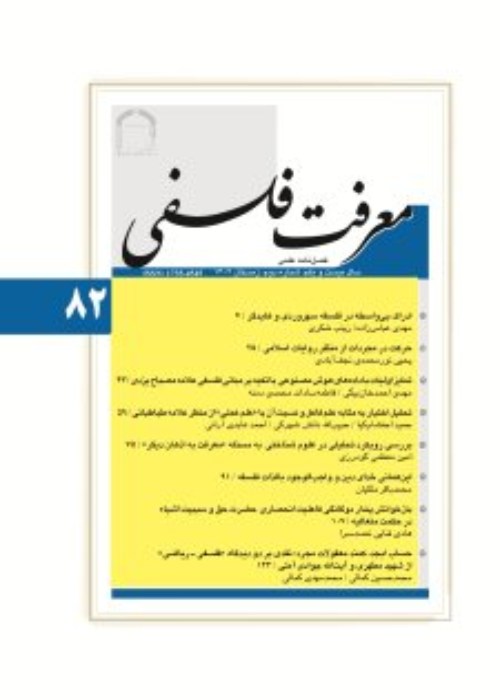Classifying Propositions as Analytics and Synthetics
Author(s):
Abstract:
This article begins with a review of the literature on the classification of propositions as analytics and synthetics and the types of such a classification: as a method, as a differentiation between propositions, and as a philosophical school. Elaborating on the question as to what in this classification is divided, and distinguishing between such technical terms as sentence, statement, proposition, and judgment, it suggests that what is in fact divided is the proposition proper. Although Kant divides judgment into analytic and synthetic, the author believes Kant has focused on the psychological aspect of the question which is not an issue to be dealt with in epistemology. Then three criteria for analyticity are discussed and criticized: A) a proposition whose predicate stands for something embodied in the meaning of its subject; B) a proposition whose negation leads to contradiction; and C) a proposition whose truth is secured by the expressions employed therein. At the end, the classification of propositions as analytic and synthetic in the Western philosophy is compared to the classification of predications (ˆaml) as primary and practically common (shāye‘ ©inā‘i) in the Islamic philosophy.
Language:
Persian
Published:
Marifat-i Falsafi, Volume:1 Issue: 1, 2004
Page:
233
magiran.com/p167628
دانلود و مطالعه متن این مقاله با یکی از روشهای زیر امکان پذیر است:
اشتراک شخصی
با عضویت و پرداخت آنلاین حق اشتراک یکساله به مبلغ 1,390,000ريال میتوانید 70 عنوان مطلب دانلود کنید!
اشتراک سازمانی
به کتابخانه دانشگاه یا محل کار خود پیشنهاد کنید تا اشتراک سازمانی این پایگاه را برای دسترسی نامحدود همه کاربران به متن مطالب تهیه نمایند!
توجه!
- حق عضویت دریافتی صرف حمایت از نشریات عضو و نگهداری، تکمیل و توسعه مگیران میشود.
- پرداخت حق اشتراک و دانلود مقالات اجازه بازنشر آن در سایر رسانههای چاپی و دیجیتال را به کاربر نمیدهد.
In order to view content subscription is required
Personal subscription
Subscribe magiran.com for 70 € euros via PayPal and download 70 articles during a year.
Organization subscription
Please contact us to subscribe your university or library for unlimited access!


